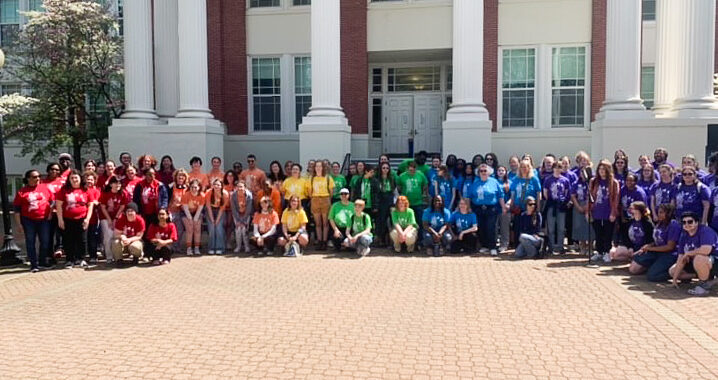Commuter Lounge in the Works
4 min readBy JESSICA MASULLI
With the renovations on Lee Hall completed and construction starting on Eagle Village, Student Government Association has taken steps toward reopening a lounge for commuter students.
The lounge would be a space for all students to socialize and study. A previous commuter lounge was located in the Tan Room of Woodard Campus Center.
Thirty-nine percent of undergraduate students at UMW commute. Commuters include anyone not living in University housing, even if they live a few blocks off campus, according to the 2007-2008 Common Data Set.
On Feb. 19, the Executive Cabinet of SGA passed a motion for the commuter lounge on campus, according to the meeting minutes.
The motion, which has also passed through Student Senate, will now be going to Dean of Student Life Cedric Rucker, according to SGA President Sean O’Brien. It will then be passed to University administrators that will determine if the space and money is available.
The Commuter Student Association has been pushing for a commuter lounge because it believes it will increase communication on campus.
“There is no middle ground for commuters,” Association President Anum Shaikh said. “We want cubicles to study in, but also a place to eat and socialize.”
According to Hassan Abdelhalim, a student senator, CSA wants to have half the space with desks and half the space with couches.
“We don’t want the space to be defined by the environment,” Abdelhalim said. “For example, we don’t want it to be like the library which is only for studying and the [Eagle’s] Nest which is only for socializing.”
Abdelhalim and Shaikh agree that a lounge would allow CSA to communicate with commuters on issues affecting them.
“Commuters are a demographic not in touch with the University,” Abdelhalim said.
The CSA would like to have a bulletin board in the lounge so the commuters can see events on campus and policy changes, according to CSA Publicity Chair Daniel Kauffman.
“CSA is a major interest group, but we could do so much more,” Kauffman said. “A lounge would allow us to advertise and have events.”
Kauffman says that commuter students need to be encouraged to interact more with on-campus students. But some commuters, like sophomore Dustin Lieske, feel that commuters do not need a lounge to feel connected.
“Last year I was lazy and not really involved, so I didn’t meet too many people outside of my classes,” Lieske said. “This year I am involved in a lot of things and have met a ton of people.”
Lieske feels there are plenty of spaces on campus to go.
“I usually try to schedule my classes back to back, but between classes I normally eat at Seacobeck or the Nest,” Lieske said.
Shaikh disagrees because she feels a lounge would attract more than commuters and be used by all students.
“We would put up a plaque saying commuter lounge, but anybody can use it,” Shaikh said. “We won’t kick non-commuters out.”
As the University aims to diversify the population, Shaikh says that a lounge may help bring more commuters to the University. The recession could make it difficult for students to afford living on campus when they have the option of commuting.
“With the economic downturn we are in, those student populations are only going to increase,” O’Brien said.
A commuter lounge would allow students to mingle with others who have similar situations.
“As a freshman, I lived in Mason. The Mason lounge was a place for people to meet others with similar housing situations,” Kauffman said.
The commuter lounge was not heavily used when it was around, prior to the Lee Hall construction, according to Rucker.
“When I went in, there was only ever four or five students at a time,” Rucker said.
The James Farmer Multicultural Center needed to use the space where the lounge had been after Lee Hall closed.
According to Rucker, a commuter lounge will not be established for this year because the Multicultural Center will continue to be in the Tan Room until Fall 2009.
“The motion was a look into a lounge so I think as the move to Lee Hall is finalized, we will have a better idea of what available space would present a good option,” SGA President O’Brien said.
The cost for a commuter lounge is currently unknown because the planning stages have just begun.
“Even in the budget situation we find ourselves in, I do not feel that the cost would be prohibitive,” O’Brien said, adding that he has talked to commuters about this issue. “[They] are not looking for a state-of-the-art hangout; they are looking for a place where they can meet people and socially and professionally network.”
A student committee is also compiling a report in response to the library protest during finals in the Fall 2008 semester, which will include a section about the commuter lounge. According to O’Brien, the protest was not just about library hours, but also about a need for student space. The report is going to be sent to the Acting Provost Nina Mikhalevsky.
“Included in that report will probably be the recommendation to re-establish a commuter lounge,” O’Brien said.
CSA hopes that through this committee, not affiliated with SGA, and through their SGA motion, a lounge will be established.
“It won’t happen this year, but the process is started to put it into construction plans,” Abdelhalim said.











